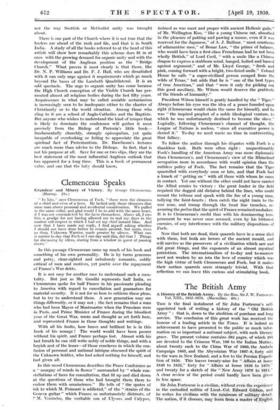Clemenceau Speaks
Grandeur and Misery of Victory. By George Clemenceau. (Harrap. 21s.) "In him," says Clemenceau of Foch, "there were the elements of a chief and even of a hero. He lacked only those elements that raise man above personal and accidental consideration. We pulled in the same collar, and glad would I be to add with the same heart, if I was not contradicted by the facts themselves. Above all, I owe " him a grudge for not having allowed me to end my days in the modest self-respect in which I had set my chief inward bliss. And now that I have made my. reply, I find myself asking whether I should not have done better to remain present, but mute, even as thou, Unknown Warrior, made greater by silence. What can it matter to-day that Foch or I one day said this, did that ? Things for discussing by idlers, staring from a window in quest of passing shows."
In this passage Clemenceau stuns up much of his book and something of his own personality. He is by turns generous and petty, clear-sighted and nebulously romantic, coldly critical of men and motives, yet poetic over the repayment of France's War debts.
It is not easy for another race to understand such a men- tality. But just as Mr. Gandhi represents half India, so Clemenceau spoke for half France in his passionate pleading to America with regard to cancellation and guarantees for material security. It is not for us here to criticize these pleas, but to try to understand them. A new generation may see things differently, or it may not ; the fact remains that a man who had been Mayor of Montmartre when the Prussians were in Paris, .and Prime Minister of France during the bloodiest year of the Great War, wrote and thought as set forth here, and represented France in those thoughts and writings.
With all his faults, how brave and brilliant he is in this book of his nonage ! The world would have been poorer without his spirit, and France perhaps lost. Almost with his last breath he can still write nobly of noble things, and with a boyish zest of the lesser—of those conclaves in which the con- fusion of personal and national intrigue obscured the spirit of the Unknown Soldier, who had asked nothing for himself, and bad given all.
In this mood Clemenceau describes the Peace Conference as a nosegay of minds in flower" surrounded by "whole con- stellations of faces for consultation, that lit up and died down at the questions of those who had brought them there to endow them with omniscience." He tells of "the spates of ink to which M. Poincare is addicted,": of the "strains of the Geneva guitar" which France .so unfortunately, distrusts, of `' M. Venizelos, the veritable son of Ulysses and Calypso, imbued as was meet and proper with ancient Hellenic guile," of Mr. Wellington Koo, "like a young Chinese cat, absorbed in the pleasure of patting and pawing a mouse, even if it was reserved for the Japanese," of A. J. Balfour, "most courteous of adamantine men," of Bonar Law, "the prince of balance, who would have been a first-class Frenchman had he not been wholly British," of Lord Cecil, "with a smile like a Chinese dragon to express a stubborn mind, banged, bolted and barred against argument," and of Mr. Lloyd George, "fresh and pink, coming forward with a bright, two-fisted smile." Colonel House he calls "a super-civilized person escaped from the wilds of Texas," but adds that he is "one of the best types of true American," and that "were it only for picking out this good auxiliary, Mr. Wilson would deserve the gratitude of the friends of humanity."
President Wilson himself is gently handled by the" Tiger." Always before his eyes was the idea of a peace founded upon right (Clemenceau would claim the same for himself), and he was "the inspired prophet of a noble ideological venture, to which he was unfortunately destined to become the slave." Logically, following Clemenceau's channel of thought, the League of Nations is useless, "since all executive power is denied it." To-day we need waste no time in controverting that fallacy.
To follow the author through his disputes with Foch is a thankless task. Both were often right : unquestionably Foch's handling of the American Army was More diplomatic than Clemenceau's, and Clemenceau's view of the Rhineland occupation more in accordance with world opinion than the ruthless policy of Foch. The fact remains that the Tiger quarrelled with everybody soon or late, and that Foch had a knack of "getting on" with all those with whom he came in contact. Yet one without the other could not have carried the Allied armies to victory : the great leader in the field required the dogged old dictator behind the lines, who could mount the tribune and speak with the fire of a young man, rallying the faint-hearts ; then catch the night train to the war zone, and tramp through the front line trenches, re- assuring the poilus that the spirit of France remained unshaken. It is to Clemenceau's credit that with his domineering tent- perarnent he was never once accused, even by his bitterest enemies, of any interference with the military dispositions of Foch.
Now that both are dead, their quarrels have in a sense died with them, but both are heroes of the ancient mould, and will survive as the preservers of a civilization which saw and did great things, and the exponents of an almost mystical patriotism. The internationalism of to-day and to-morrow need not weaken by an iota the love of country which was the high virtue of both Clemenceau and Foch, but it makes their surface quarrels seem strangely trivial. With that reflection we can leave this curious and stimulating book.










































 Previous page
Previous page